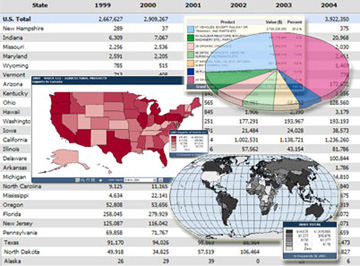Introduction
Trade stats express is a service provided by the international trade administration to avail the latest annual and quarterly trade data of the United States. It gives the current trade statistics at national and state levels. The export and import trade balances are custom-tailored to year and dollar ranges as well as display preferences. The national trade data and state export data category have two main sections with each having the same basic tools.
The data provided by the trade stats express is usually timely and accurate (Haddad and Shepherd, 2011). Analysts and economists utilize this data to develop strategies and recommendations that directly translate to sound economic policies. The data still provides trade flows for the foreign markets making the local business improve their standards to reach international competition.
The US national trade data reflects government and non-governmental shipments of merchandise between that nation and its custom territory, composed of the fifty states. The US Census Bureau provides this national trade data. The data gives the current foreign trade analysis as well as detailed value of commodities. This graph shows the national trade data from 1999 to 2004 as provided by the Census Bureau.

This data is helpful in determining the best state to target their production efforts. It helps her to gauge the local market size per state hence develop the market strategy (Haddad and Shepherd, 2011).
The Chinese holdings of the Yuan undervalued are the leading causes of the bilateral trade deficit between United States and china. In other words, United States imports from China are far more than the exports to China. However, this relationship between the value of Yuan and the trade balance does not reflect in the international trade data (Moosa, 2012).
The trade balance has continued to grow until 2009. This formed the climax of accumulation as the economy of the United States fell by more than 20 percent, and the exports were flat. China has held the value of the currency as compared to the United States. This makes the exports form United States less competitive in the international market.
United States has therefore, been recording negative trade balance with China monthly form 2005 to 2011. This is because of the excess imports United States makes form China as compared to its exports to the same country. United States has maintained a negative trade deficit with China. The deficit clinched $ 27 billion in November 2011.
Report
The bilateral relationship between China and United States has been constrained and complicated by the uneven nature of financial flows between the two countries. This deficit has had an impact on the both individual and national level of the participants (Moosa, 2012). These effects are more explicit in United States. At the individual level, living standards of persons has significantly gone down. This is because of the immense number of persons who have lost jobs since 2005.
The deficit of U.S with China has caused the former more than 2.8 million jobs between 2005 and 2011. The biggest net losses in jobs were in Texas, California, Illinois, Florida, and North Carolina. At the national level, the effect is still immense. The national GDP has dropped from $ 278 Billion in 2005 to $ 84 in 2009.
The Chinese economy, on the other hand has been on the rising end. Currency manipulation has exacerbated the biased trade balance between United States and China. The currency of china is pegged hence does not fluctuate in the world market like that of United States (Haddad and Shepherd, 2011). This has rendered it to remain artificially low hence subsidizing the Chinese exports and raising the US exports artificially.
The US goods therefore are less competitive in the world market. This situation has forced the imports by the United States from China to rise significantly with extremely few exports made. This directly translates to loss of jobs by the Americans. The country has consistently piled up foreign debt hence losing its export capacity.
This is the main contributor to the crisis in US manufacturing sector. Other causes of deficit in the trade balance are the Chinese nature of suppressing its labor rights. This lowers the production cost within China. The extensive foreign direct investment by China is also a factor to consider.
References
Haddad, M & Shepherd, B. (2011). Managing Openness: Trade and Outward-Oriented Growth After the Crisis. Washington, DC: World Bank Publications.
Moosa, I. (2012). U.S.-China Trade Dispute: Facts, Figures and Myths. Cheltenham: Edward Elgar Publishing.